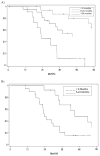Outcomes of salvage surgery with free flap reconstruction for recurrent oral and oropharyngeal cancer
- PMID: 20013840
- PMCID: PMC3389788
- DOI: 10.1002/lary.20743
Outcomes of salvage surgery with free flap reconstruction for recurrent oral and oropharyngeal cancer
Abstract
Objectives/hypothesis: To evaluate outcomes of salvage surgery with free flap reconstruction for recurrent squamous cell carcinoma of the oropharynx and oral cavity with increased use of chemoradiotherapy.
Study design: Retrospective patient review.
Methods: All patients undergoing salvage surgery with free flap reconstruction for oropharynx (n = 36) and oral cavity (n = 36) squamous cell carcinomas between January 2001 and January 2008 were obtained. Mean follow-up was 14 months. Previous chemoradiotherapy was used in 40% and radiotherapy alone in 60%.
Results: Complications were more frequent in oropharynx than oral cavity tumors (36% and 14%, respectively; P = .05) requiring more secondary procedures (15 for oropharynx vs. six for oral cavity). Few patients returned to a normal diet (8%), and a majority retained an enterogastric feeding tube (56%). Median survival overall following salvage surgery was 44.8 months for oral cavity and 53.8 months for oropharynx head and neck squamous cell carcinoma. Overall estimated 1-, 2-, and 5-year observed survivals were 98%, 77.2%, and 43.7%, respectively. Twelve patients had a disease-free interval of <6 months, 92% of whom died of disease. Of 17 patients with disease at the primary site and involved regional lymph nodes, 94% died of disease.
Conclusions: Salvage surgery with free flap reconstruction for recurrent oral and oropharyngeal tumors after chemoradiotherapy has acceptable morbidity and similar cure rates as salvage following radiotherapy without chemotherapy. Concurrent nodal recurrence and short disease-free interval are associated with reduced cure rates. A significant proportion will require enterogastric feeding and few will tolerate a normal diet.
Figures



Similar articles
-
[Assessment of disease-free survival in patients with loco-regional recurrence of squamous cell carcinoma of the oral cavity and oropharynx submitted to salvage treatment].Rev Assoc Med Bras (1992). 2008 Mar-Apr;54(2):127-31. doi: 10.1590/s0104-42302008000200014. Rev Assoc Med Bras (1992). 2008. PMID: 18506320 Portuguese.
-
Second salvage surgery for re-recurrent oral cavity and oropharynx carcinoma.Head Neck. 2010 Aug;32(8):997-1002. doi: 10.1002/hed.21298. Head Neck. 2010. PMID: 20191624
-
Prognostic factors in salvage surgery for recurrent oral and oropharyngeal cancer.Head Neck. 2006 Feb;28(2):107-13. doi: 10.1002/hed.20309. Head Neck. 2006. PMID: 16388526
-
Survival outcomes following salvage surgery for oropharyngeal squamous cell carcinoma: systematic review.J Laryngol Otol. 2018 Apr;132(4):299-313. doi: 10.1017/S0022215117000998. Epub 2017 May 15. J Laryngol Otol. 2018. PMID: 28502256
-
Interventions for the treatment of oral and oropharyngeal cancers: surgical treatment.Cochrane Database Syst Rev. 2018 Dec 24;12(12):CD006205. doi: 10.1002/14651858.CD006205.pub4. Cochrane Database Syst Rev. 2018. Update in: Cochrane Database Syst Rev. 2023 Aug 31;8:CD006205. doi: 10.1002/14651858.CD006205.pub5. PMID: 30582609 Free PMC article. Updated.
Cited by
-
Feasibility Outcomes of a Pilot Randomized Clinical Trial to Increase Cruciferous and Green Leafy Vegetable Intake in Posttreatment Head and Neck Cancer Survivors.J Acad Nutr Diet. 2019 Apr;119(4):659-671. doi: 10.1016/j.jand.2018.11.005. Epub 2019 Jan 17. J Acad Nutr Diet. 2019. PMID: 30661935 Free PMC article. Clinical Trial.
-
Transoral Robotic Surgery for Oropharyngeal and Hypopharyngeal Squamous Cell Carcinoma.Cureus. 2024 Mar 29;16(3):e57186. doi: 10.7759/cureus.57186. eCollection 2024 Mar. Cureus. 2024. PMID: 38681419 Free PMC article. Review.
-
Salvage transoral robotic surgery in recurrent oropharyngeal carcinoma: a single-center retrospective study.Eur Arch Otorhinolaryngol. 2024 Jun;281(6):3167-3177. doi: 10.1007/s00405-024-08590-4. Epub 2024 Mar 28. Eur Arch Otorhinolaryngol. 2024. PMID: 38546850
-
Reirradiation with IMRT for recurrent head and neck cancer: A single-institutional report on disease control, survival, and toxicity.Rep Pract Oncol Radiother. 2017 Jul-Aug;22(4):331-339. doi: 10.1016/j.rpor.2017.05.001. Epub 2017 Jun 7. Rep Pract Oncol Radiother. 2017. PMID: 28663716 Free PMC article.
-
Gastrostomy tube use after transoral robotic surgery for oropharyngeal cancer.ISRN Otolaryngol. 2013 Jul 8;2013:190364. doi: 10.1155/2013/190364. Print 2013. ISRN Otolaryngol. 2013. PMID: 23936676 Free PMC article.
References
-
- Chen AY, Schrag N, Hao Y, et al. Changes in treatment of advanced oropharyngeal cancer, 1985–2001. Laryngoscope. 2007;117:16–21. - PubMed
-
- Robertson AG, Soutar DS, Webster M, et al. Early closure of a randomized trial: surgery and post-operative radiotherapy versus radiotherapy in the management of intra-oral tumours. Clin Oncol. 1998;10:155–160. - PubMed
-
- Brizel DM, Albers ME, Fisher SR, et al. Hyperfractionated irradiation with or without concurrent chemotherapy for locally advanced head and neck cancer. N Engl J Med. 1998;338:1798–1804. - PubMed
-
- Forastiere AA, Goepfert H, Maor M, et al. Concurrent chemotherapy and radiotherapy for organ preservation in advanced laryngeal cancer. N Engl J Med. 2003;349:2091–2098. - PubMed
-
- Pignon JP, Bourhis J, Domenge C, et al. Chemotherapy added to locoregional treatment for head and neck squamous cell carcinoma: three meta-analyses of updated individual data. MACH-NC Collaborative Group. Meta-analysis of chemotherapy on head and neck cancer. Lancet. 2000;355:949–955. - PubMed
MeSH terms
Grants and funding
LinkOut - more resources
Full Text Sources
Medical

